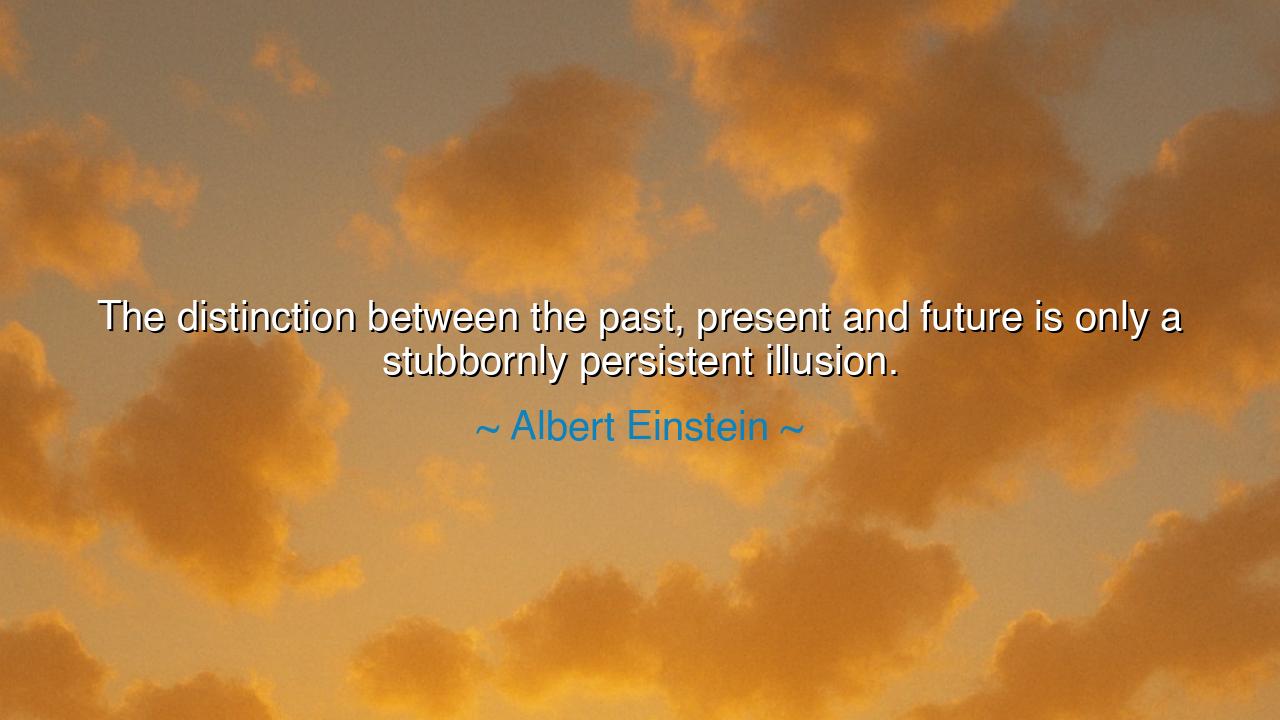
The distinction between the past, present and future is only a
The distinction between the past, present and future is only a stubbornly persistent illusion.






In the vast expanse of existence, where time flows like a mighty river, we often find ourselves ensnared by the illusion of time’s separation—past, present, and future. Yet Albert Einstein, the mind who saw the very fabric of the universe, proclaimed, “The distinction between the past, present, and future is only a stubbornly persistent illusion.” These words resonate with the ancient understanding that the flow of time is not as linear as we might believe. Einstein's insight invites us to consider that the very essence of time itself—our understanding of past events and our anticipation of the future—is a creation of the mind, a mere perception, rather than an absolute reality.
The ancient philosophers, especially those from the Eastern traditions, were keenly aware of the fluidity of time. Buddha spoke of the impermanence of all things, recognizing that the moment is all that truly exists. In his teachings, the past is merely a fading memory, and the future, though it may seem full of possibilities, is never truly real until it arrives. The present moment is the only time that truly exists, and it is within this eternal now that we must find peace and meaning. Einstein echoes this ancient wisdom—our fixation on the separation of time into discrete periods is a mental construct that obscures the deeper truth of the unity of all moments.
Consider the wisdom of Heraclitus, the ancient Greek philosopher, who famously said, "You cannot step into the same river twice." This metaphor speaks to the constant flux of life—the understanding that everything is in motion, and the distinctions we draw between past, present, and future are ultimately arbitrary. The river of life, like the river of time, flows continually. The water that once was is no longer, and what will come is yet unseen, but the flow is unbroken. Just as Heraclitus taught, time, too, flows, and our attachment to its divisions creates the illusion that moments are fixed when, in reality, they are in perpetual motion. Einstein's words challenge us to see beyond these divisions, to recognize that the past and future are merely projections, while the present moment is all that truly exists.
The Stoics of ancient Rome, too, echoed this understanding. Marcus Aurelius, in his Meditations, reflected deeply on the fleeting nature of time. He understood that the present moment was the only one in which we truly had control, and that both the past and the future are beyond our grasp. In his writings, he implores us to live in harmony with the now, for it is within this moment that we can act with virtue and purpose. To cling to the past or worry about the future is to be ensnared by an illusion. Aurelius understood, as Einstein later did, that time is not a series of isolated moments, but a continuous, flowing river in which we must immerse ourselves fully to understand its true nature.
Consider also the story of Leonardo da Vinci, whose work transcended the confines of time. Da Vinci, ever curious and engaged in the world, did not see his creations as belonging to a past or a future but as part of an eternal pursuit of knowledge and beauty. His paintings, inventions, and notebooks stand as testament to a mind that moved freely through time, recognizing that creation is not bound by the divisions of time. He understood that the essence of art and discovery lies in the eternal, in the present moment—the same truth that Einstein later grasped when he unraveled the mysteries of space-time. Da Vinci’s genius was rooted in his ability to live beyond the constraints of time, much like Einstein, who explored the fluidity of the universe.
The lesson of Einstein’s words is one of profound awareness. By recognizing the illusion of the divisions between past, present, and future, we can find freedom from the anxieties that bind us to these constructs. Time, as we experience it, is a mental framework, and while it has practical applications, our attachment to its divisions often causes unnecessary suffering. If we, like the ancients, can free ourselves from the obsession with past regrets and future fears, we open ourselves to the power of the present—where true action and peace reside. By recognizing that all moments are part of the same eternal flow, we can live more fully and with greater purpose.
In our own lives, we must learn to embrace the present moment as the only reality we can control. While we cannot change the past, nor predict the future, we can choose how to act now. Let go of the illusion of separation between the moments. Live with the understanding that the true power lies in how we respond to life as it unfolds, right in this moment. Whether in our work, our relationships, or our personal growth, the present is the field where all things are created. Let us live fully, knowing that the future will come in its own time, and the past is already written. Only in this eternal present can we find peace, purpose, and the clarity to navigate the world.






AAdministratorAdministrator
Welcome, honored guests. Please leave a comment, we will respond soon